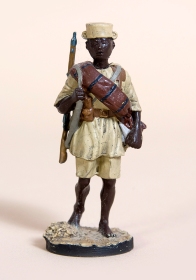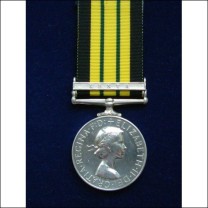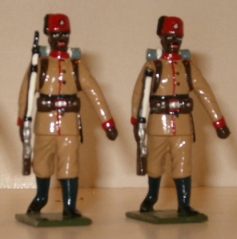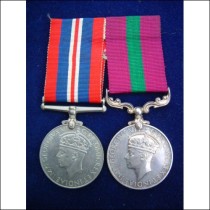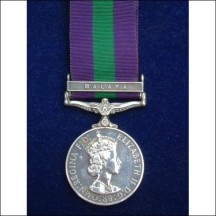Like the troops of all British and colonial army regiments, the officers and askari of the King’s African Rifles could receive a range of Campaign, Long Service and Gallantry Medals for their service.
This is a short summary of the medals most likely to be seen on the tunic of a KAR askari.
When the askari of the earlier regiments that preceeded the KAR transferred to the newly-formed regiment in 1902, they might have already received the Central Africa Medal, the East and West Africa Medal, the Central and East Africa Medal or the Ashanti Medal for numerous punitive expeditions and small campaigns to pacify rebellious African tribes and suppress Arab slave traders between 1891 and 1900.
In the same year that the KAR were formed, these earlier Campaign Medals were replaced with the Africa General Service Medal (GSM) which was awarded to British and colonial forces for small wars and campaigns in Africa for fifty-four years, until 1956.
Forty-five different clasps were awarded with this medal for particular campaigns. Most of these clasps were awarded for actions in the longest campaign of the KAR’s history, against Mohammed Abdullah Hassan – known to the British as the “Mad Mullah”– an Islamic fundamentalist who fought a twenty-year, anti-imperialist war in Somaliland (modern Somalia) and for campaigns and expeditions in Nigeria, Nyasaland (modern Malawi) and the Northern Frontier District of Kenya (now South Sudan) in the years up to 1920.
After a gap of thirty-six years, the last and most-widely awarded clasp for the Africa General Service Medal was “Kenya” for the Mau-Mau Uprising between 1952 and 1956.
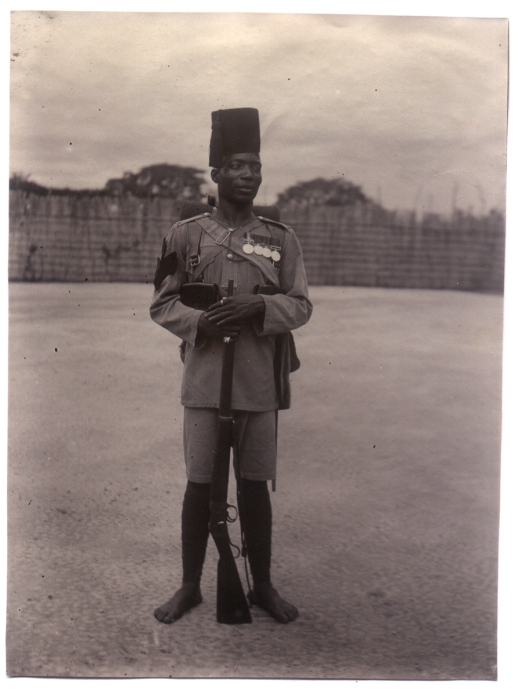
This superb photograph shows a Sergeant of the KAR around 1905 – he probably served with the Central African Rifles prior to 1902 because he wears the Central Africa Medal with clasp “Central Africa 1894-98” the East and West Africa Medal, the Ashanti Medal and the Africa General Service Medal with unknown clasp.
First World War
The Africa General Service Medal was reserved for small wars and campaigns – including those during the First World War but against local opposition rather than German forces; it was not awarded for the campaign to capture German East Africa (later Tanganyika, now Tanzania) and defeat the German East African equivalent of the KAR, called the Schutztruppe. For this campaign, askari were eligible for the 1914-15 Star, if they served between August 1914 and December 1915, the British War Medal and the Victory Medal – as were all troops who fought in the First World War.
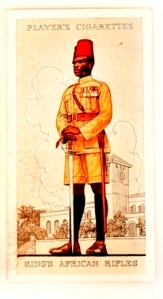
Players cigarette card – hover your mouse over the image for medal details or click to enlarge the picture
Between 1907 and 1942, an African askari completing a period of unblemished service would receive the King’s African Rifles Long Service and Good Conduct Medal. Until 1932 the qualifying period for this medal was eighteen years. This meant that it was issued on the day of discharge when the recipient had no opportunity to wear it. After 1932 the qualifying period was reduced to sixteen years.
Second World War and After
During the Second World War African askari qualified for the War Medal wherever they served and the Africa and Burma Stars if they fought in these theatres.
After the war, in the early 1950s, the 1st and 2nd (Nyasaland) Battalions and the 3rd (Kenya) Battalion of the KAR were deployed to fight Chinese communist insurgents in Malaya (modern Malaysia).
Officers and askari who served in this campaign were eligible for the British and Commonwealth General Service Medal – which is different to the Africa General Service Medal – with the clasp “Malaya”.
Gallantry Medals
British officers received a wide range of Gallantry Medals for their service with the KAR – including the Victoria Cross, the highest award “For Valour”. The medal most frequently awarded to African askari for gallantry in the face of the enemy was the African Distinguished Conduct Medal (DCM).

